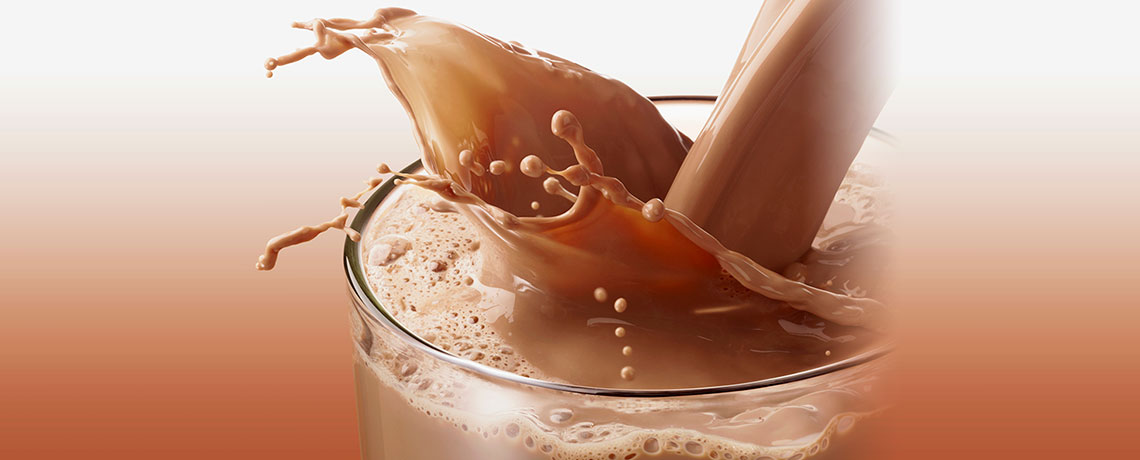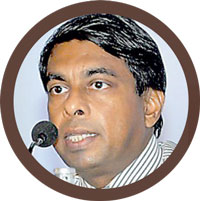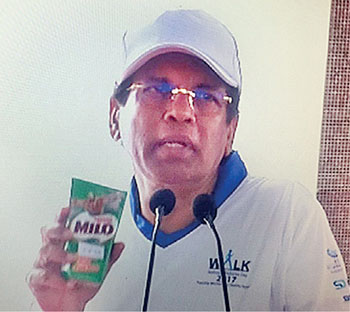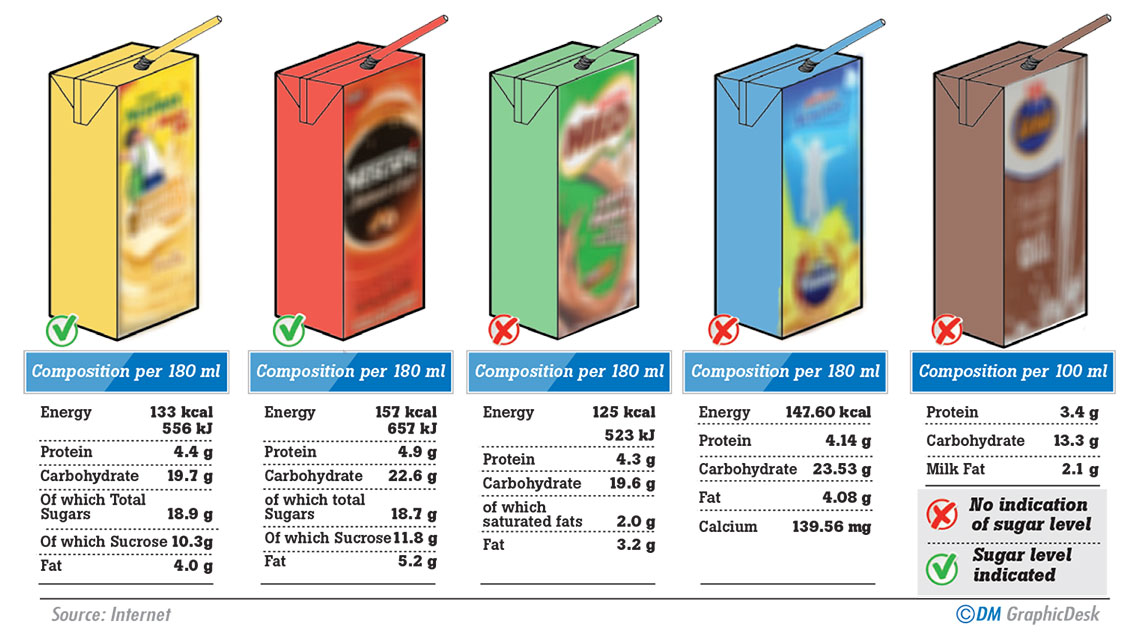27 Nov 2017 - {{hitsCtrl.values.hits}}

 Malted and soft drinks with the lip smacking goodness of sugar are often considered popular beverages favoured by many school children and adults alike. Regardless of the various health risks involved with high sugar intake, it’s a pity to observe how school children are often targeted in a heartless manner by industries promoting soft and malted drinks.
Malted and soft drinks with the lip smacking goodness of sugar are often considered popular beverages favoured by many school children and adults alike. Regardless of the various health risks involved with high sugar intake, it’s a pity to observe how school children are often targeted in a heartless manner by industries promoting soft and malted drinks.
Keeping in line with the need to cut down on the sugar content in such beverages, President Maithripala Sirisena recently targeted Nestle’s malted, ready to drink product, , warning that the company reduce the beverage’s sugar content from the current 16.5 percent to less than 5 percent. Explaining his stance on the matter during a walk that was launched recently to mark the World Diabetic Day, the President was reported to have said that he would continue to oppose the product until its’ sugar level is reduced to meet his recommendation.
Unfortunately, in Sri Lanka, this situation is very much in disarray as such industries are having easy access to schools through lucrative sponsorships
 Advertising mafia
Advertising mafia
Commenting that all malted and sweetened drinks aren’t suitable for children, Consultant Physician, Diabetologist and Former Head of the Toxicology and National Poisons Information Centre at the National Hospital of Colombo, Dr. Waruna Gunathilake said that such malted and sweetened drinks contain a high energy and calorie value. Stating that most beverages available in the market are concealing the sugar level contained, he said that this has become a major problem leading into the risk of developing high sugar level, high cholesterol and heart diseases in people. Furthermore, he noted that the standard of labelling such products is also not up to the market’s expectation.
“The issue lies in the fact that although such beverages aren’t suitable for children, the industry is targeting the young. The best example would be the time-frame during which cartoons are featured for children on the T.V. There are so many advertisements related to malted drinks featured on television targeting young children. This is a very dangerous trend. Comparatively, if you observe other countries, you may notice that such actions aren’t permitted. Most western countries don’t have this practice of targeting young children using such advertisements when there is a break during a cartoon show. This is mainly because it won’t help induce the children into consuming the malted products that are deemed unsuitable for them. Not only the labelling that contains the sugar level but the advertisement campaign for such products should be regulated in Sri Lanka,” stressed Dr. Gunathilake.
According to Dr. Gunathilake the second issue that’s associated with the malted and sweet beverages industry is the effective business strategy that they employ to market products. He said that the malted drink industry has already invaded the schools including preschools where the younger generation resides during the larger part of the day. “This is a deliberate move by the industry targeting young children where trophies, certificates and the ‘Cricketer of the Year’ are promoted through malted beverage companies. This is a very strategic method through which they enter the country’s education system. In developed countries, such practices aren’t permitted and dangerous elements are always kept away from children. Unfortunately, in Sri Lanka, this situation is very much in disarray as such industries are having easy access to schools through lucrative sponsorships,” he said.
He added that as a country it’s quintessential to have a good vision and mission to curb sugar intake. Dr. Gunathilake pointed out that the featuring of the red label alone on sweetened drinks wouldn’t be effective for this purpose. “This is a very myopic thinking because if we can introduce a red labelling system to cut down on the sugar content, then we should bear in mind that the other avenues leading to high sugar intake should also be curbed successfully. Sri Lanka should learn from the initiatives taken by other countries to control such issues and put them into better practice” he added.
 Artificial sweeteners
Artificial sweeteners
Speaking to Daily Mirror, Nutrition and Dietetics Specialist Dr. Damayanthi Perera said that according to the World Health Organization (WHO), the direct sugar intake for a day should be below 25 grams for adults and children. Sugar isn’t a necessary constituent of the diet. Approximately, a teaspoon of sugar may amount to five grams, said Dr. Perera. Bearing this in mind, she commented that the daily sugar intake of a child or adult, therefore depends on how many packets of sweetened beverages or sweet meats he or she would have consumed within a day. In addition to tea and coffee, if the child consumes other sugary products regularly, it would be difficult to remain within the recommended 25 grams limit.
People should be warned that consuming artificial sweeteners may not contribute to one’s health in the long run
“Most of the commercial products available in the market contain a high level of sugar. However, the norm has now shifted from sugar to focusing on artificial sweeteners. For an example, when the Nutrition Month was observed in the country this year, the main focus was on cutting down on the intake of sugar. As a result, there were plenty of advertisements published in newspapers promoting artificial sweeteners as an alternative for sugar. This is obviously not a good trend. Comparatively, consuming sugar in small quantities ensures that the risk is less to one’s health.
Artificial sweeteners are chemical based compounds. Internationally, there is emerging evidence that artificial sweeteners may cause side effects, including neurological involvements. Therefore, cutting down on the sugar intake shouldn’t be looked upon as an opportunity to promote artificial sweeteners. People should be warned that consuming artificial sweeteners may not contribute to one’s health in the long run” Dr. Perera said.
“The traditional jaggery made of treackle and coconut palms and coconut sugar (a novel product) are better alternatives to refined, white (table sugar) and artificial sweeteners. “Sri Lanka should explore the commercial production of Coconut sugar” she opined.
Why control the sugar craving?
It’s a well-known fact that sugar is controlled within the body by the insulin hormone. Therefore, when inquired as to how excess sugar intake could affect one’s health, Dr. Gunathilake explained that when an individual is frequently exposed to food and beverages containing high sugar levels, the pancreas which generates insulin will be exhausted with the passage of time. “The pancreas will fail to cope with the production of insulin as the frequent bouts of sugar intake increases. This results in the pancreas failing at one point because it doesn’t have a reserve for energy to develop more insulin to curb sugar levels. Hence, if an individual has a high sugar intake, the pancreas will fail to function properly thereby lowering the insulin level, eventually leading to diabetes. Also, such sweetened beverages contain fat in addition to sugar. This leaves one with the risk of developing obesity. Thus, it should be noted that a high sugar intake could also lead to obesity in an individual. On the other hand, it should also be noted that weight gain and obesity alone can lead to insulin resistance; meaning that even if the insulin is present in the body, it will not function properly resulting again in the increasing sugar levels in the body,” explained Dr. Gunathilake.
 When the Daily Mirror contacted Nestle on President Sirisena’s hard hitting comment and allegation with regard to the sugar content present in the beverage produced by Milo, the company responded with statement stating that it would be subject to changes soon.
When the Daily Mirror contacted Nestle on President Sirisena’s hard hitting comment and allegation with regard to the sugar content present in the beverage produced by Milo, the company responded with statement stating that it would be subject to changes soon.
Despite the continuous awareness programmes carried out to discourage the consumption of sugar in high quantities, especially in the form of sweetened soft drinks including malted drinks, it’s a pity to observe how children and adults are continuously being trapped in this venomous cycle. Therefore, it’s the responsibility of every conscious citizen to either completely abstain or limit the intake of sugary products such as sweetened beverages or sweet meats to ensure a disease-free nation.

‘Changes in our packaging soon’ - Nestlé
We share public concerns about the health risks associated with consumption of excess sugars. As part of our contributions to public health efforts, we have reduced the content of sugars added in our products over the years and are committed to make further progress in this regard.
Over the last five years, we have reduced sucrose (added sugar) in MILO Ready-To-Drink (RTD) by 32%. Currently, a MILO RTD pack contains only 8.2 grams of sucrose (added sugar). This is less than 5% of the total product and roughly equivalent to two teaspoons of sugar. By our own internal analyses, MILO RTD currently contains one of the lowest levels of sucrose in the local milk-based beverage category
To empower people to make informed choices about what they consume, we have started voluntarily providing clear and transparent nutrition information and labelling on our products. It is an ongoing process as it requires changes in our packaging. This has already been done for our other RTD packs and the process has begun for Milo. We expect MILO RTD with the new packaging to be in the market soon.
23 Dec 2024 1 hours ago
23 Dec 2024 2 hours ago
23 Dec 2024 2 hours ago
23 Dec 2024 3 hours ago
23 Dec 2024 3 hours ago